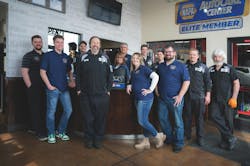Growing up in the industry as a technician, seeing yourself running a shop of your own one day—it’s a common start to many paths of shop ownership. What many don’t see up ahead are the curves and twists that come with overseeing an entire business and expanding into areas that you didn’t previously have to consider.
It’s a journey Roy Foster knows all too well. Since his father opened Roy Foster’s Automotive in Reno, Nevada, over 50 years ago, it’s been through many different periods of growth—and ownership. When it was time for Foster to step in the role of an owner, he was as ready as anyone could be; but there are some lessons you can only learn from first-hand experience.
How the Pieces Fall Into Place
Foster’s father first opened the shop in 1947, originally as a service station. He named the shop after himself, and conveniently shares his name with his son and current owner.
While Foster was raised around automotive work, his father came from a farming background and was the first in his family to pursue auto service. He got experience fixing up farm equipment and eventually went on to work in service stations. After serving as a Navy man in World War II, he then moved out to Reno to open his service station in the '40s.
Foster’s involvement in the business came when he was in junior high. He started helping out around the shop, and always saw himself following in his father’s footsteps.
“I've always had a passion for the business, and always thought that's what I would do. In high school, of course, I was thinking what else I might do—but it always just came back to, ‘Yeah, this is in my bloodline,’” recalls Foster.
However, when Foster’s father passed away in 1980, it would be his two older brothers that took over operating the business. There would be a period of growing pains as one brother realized he preferred to work as an employee, and stepped away from an operator role.
The shop was a Chevron station until around 1990, when Chevron reached out to the business and said they wanted to replace its service stations with a convenience store. Rather than forego the shop’s successful repair business, it would split off into its own separate entity. The existing store was converted into a gas station and convenience store, while the shop’s repair work was moved into another building.
Throughout all of this, Foster remained with the shop, working as a technician. When the business split up, Foster was a natural fit to oversee the repair shop, while his older brother continued to oversee the older location’s operations as a convenience store.
Thinking Like a Business Owner
While Foster had plenty of experience working with vehicles as a technician, he would soon discover that it was a whole different playing field as a shop owner. There were now many different aspects of his job competing for his time and energy.
“It's a whole other area of expertise that you have to learn: what numbers you need to look at, how to do marketing, how to lead employees, how to keep up with the times, reinvesting,” says Foster. “You don't know what you don't know, right? People looking at a shop, they see all the cash flow and big repair orders, but what they don't see is the other side of the business.”
For Foster, seeking out coaching companies has been an invaluable asset to his operations. The guidance he received helped him build a process that can easily be duplicated and carried over for whenever the business is handed to someone else.
Part of that has involved investing in his employees through a myriad of ways. Being a husband and the father to seven children, Foster always valued his family before all else, and integrated a healthy work-life balance into his shop’s culture. All of his employees are provided with benefits that allow them to take care of themselves and family, as well as plenty of paid time off.
Knowing that not only he but his employees are taken care of is part of what reminds Foster why it’s so important to manage a business properly.
“You have to be able to manage and run your business properly in order to accomplish all these things—to reinvest, to keep up with the technology, to have the best talent, to take care of them the best you can, so they can also have their work-life balance, make a great living, and get paid for the value that they bring.”
The shop also has a NAPA Apprentice Program, which provides both hands-on training and an online curriculum, with students receiving a tool set at the end of their training.
The training and career opportunities his shop has offered people has been one of the most gratifying parts of Foster’s career. His own son even found his calling through the NAPA Apprentice Program, after a potential career in college baseball didn’t turn out how he planned due to the COVID-19 pandemic.
At the same time, he saw how much he could make through a career in automotive repair and decided to pivot from baseball to joining the apprentice program. He saved his money and bought a house, all before his friends were able to finish their college studies.
It’s worked out great for him, but his success is something Foster wants everyone in the field to see. Through efforts like his apprentice program, he hopes to play an active role in recreating that same result for others.
“Last year, he bought a house. He has all his tools. He has no student debt, and he's well on his way in life, making great money,” shares Foster. “It's a real success story. And we’re going to continue to repeat that, over and over.”
About the Author
Kacey Frederick
Associate Editor
Kacey Frederick joined as the assistant editor of Ratchet+Wrench in 2023 after graduating from the University of Arkansas at Fort Smith with a bachelor’s in English and a minor in philosophy.
The grandchild of a former motorcycle repair shop owner, he’s undergone many trials and tribulations with vehicles. Now the proud owner of a reliable 2011 Toyota Camry, he works to represent those in the repair industry that keep him and so many others safely rolling on.

